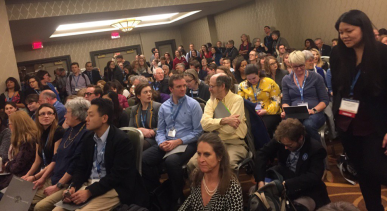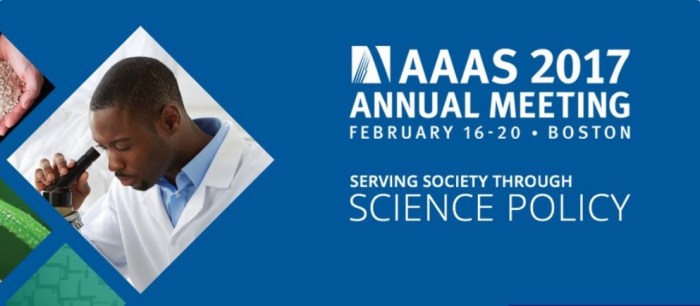(Note the title and content of this blog post are a reflection on a session at this years AAAS meeting and not an official position of the Academics for the Future of Science.)
The message of keeping science as a top priority for the U.S. was evident from many conversations at the 2017 American Association of the Advancement of Science (AAAS) meeting. The importance of engaging both scientists and non-scientists in these discussions was another important message from the meeting, and in particular in the session entitled “Defending Science and Scientific Integrity in the Age of Trump.” This session, filled beyond capacity, highlighted how everyone in the room should stand up for science, regardless of being a scientist by training. This message was particularly relevant in relation to the March for Science, which was still upcoming at the time, and the audience wanted to hear about the meaning of the event and how to get involved. The session also highlighted an elevated interest from scientists to run for office or to get more involved in advocating for science in other ways.

Speakers in this session were Lewis Branscomb (University of California, San Diego), John Holdren (former director, White House Office of Science and Technology Policy), Jane Lubchenco (Oregon State University) and Amy Luers (Skoll Global Threats Fund). The moderator (Andrew Rosenberg) and the discussant (Gretchen Goldman) were both from the Center for Science and Democracy at the Union of Concerned Scientists, where Dr. Rosenberg is the Director, and Dr. Goldman is the Research Director. Rosenberg also gave the May 2017 seminar at the “Challenges and Solutions in the Biomedical Sciences Seminar Series” organized by Jessica Polka and Iain Cheeseman at the Whitehead Institute in Boston.
Some of the questions in this session were how and why we should stand up for science, the causes we should advocate for within science, and who should get involved in advocacy. For simplicity, I list quotes or specific points as stated by the speakers mentioned below.
What concerns and fears exist about defending science?
The system is currently dominated by chaos (Amy Luers).
There is a spotlight on misinformation (Gretchen Goldman).
STEM education is at risk (John Holdren).
The fear that science will be viewed as partisan and untrustworthy (Jane Lubchenco).
Ability to supporting science in a non-partisan way (Gretchen Goldman).
Why should we advocate for science?
Science is needed at the table, and to create the new knowledge (Jane Lubchenco).
Science affects everything (Gretchen Goldman).
Science matters, science works (John Holdren).
We should look at where science-based policies have brought us (Gretchen Goldman).
What should we change to maintain the value of science?
Not enough people appreciate and value science and we need to change that (Jane Lubchenco).
We need to show why science is important for people (Jane Lubchenco).
We [also] need non-scientists to advocate for science (Gretchen Goldman).
Scientists think that passion is not scientific, but we need more passionate scientists (from the audience, and a popular tweet from this session).
Scientists need to be more engaged with society (Jane Lubchenco).
We need to change the culture of academia to make it more valued and rewarded for scientists to be more engaged with society (Jane Lubchenco).
What actions can we take to maintain science as a top priority?
Support each other when scientists choose to speak up (Gretchen Goldman).
Consider [the value of science for] public service (John Holdren).
In the short-term, we should respond to alternative facts, and [to the fact that] science [is] being pushed aside; in the long-term, we should join and create conversations with communities across the nation [about science] (Amy Luers).
Scientists can run for office in the local and state government, and [also] participate on local advisory committees (Jane Lubchenco).
The March for Science is not only for scientists, [we should] encourage non-scientists to march also (Gretchen Goldman, Jane Lubchenco).
[We should] bring along non-scientists to the March – if each person brings along two non-scientists, that is [two more people] enriched by science (Gretchen Goldman).
Show that scientists are not an elitist group isolated from the real needs of society (Gretchen Goldman).
[There is a need to] improve both public and policy maker education about science (John Holdren).
—
This post is the last in a series of articles by guest blogger Adriana Bankston, where she looked back at workshops from the recent American Association for the Advancement of Science (AAAS) Annual Meeting in Boston.
Bio
Adriana Bankston is a policy activist at Future of Research (FoR), a nonprofit organization representing junior scientists, through grassroots advocacy, to promote positive systemic change to the way we do science. Her goals are to promote science policy and advocacy for junior scientists, and to gather and present data on various issues in the current scientific system. She can be reached via LinkedIn or on Twitter.


One response to “Defending Science and Scientific Integrity in the Age of Trump: a Session at the 2017 AAAS Meeting”
Science has made our life easier, i really love science
LikeLiked by 1 person